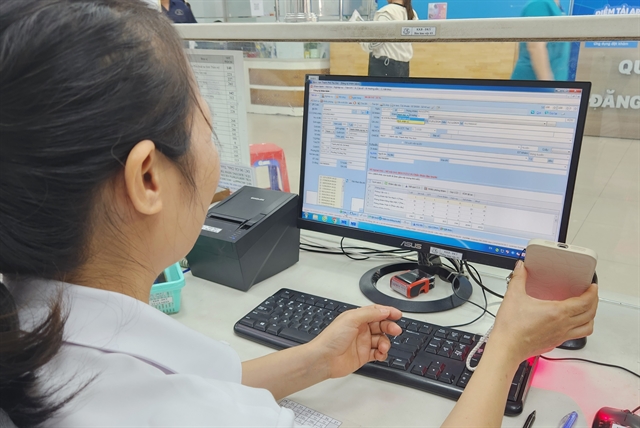 Society
Society

 |
| A health official in HCM City scans an electronic health record code on a VNeID application. — VNA/VNS Photo |
HÀ NỘI — Việt Nam is preparing to integrate electronic prescriptions into the national VNeID digital identity platform, enabling patients to purchase medicines online and, in some cases, receive them at home.
The move marks a major step in the country’s push to digitalise public healthcare services and streamline patient access to treatment.
The plan was outlined in the July conclusions of the Government’s Steering Committee on Science, Technology, Innovation and Digital Transformation.
The Ministry of Public Security – the body in charge of VNeID – has been tasked with connecting hospital-issued prescriptions to the national health data coordination system and pharmacy networks, ensuring they can be accessed in real time via the app.
The integration will be piloted in September, with nationwide deployment targeted for October. Once operational, patients will be able to view their prescriptions on VNeID, use them to purchase medicines at authorised pharmacies and, where permitted by law, arrange for home delivery.
The Ministry of Health confirmed that under Circular 26, all hospitals must issue outpatient prescriptions electronically by October 1, while other medical facilities must comply by January 1, 2026.
Data from the national e-prescription system will be automatically integrated into VNeID, allowing patients to track treatment history, see prescribed medicines and present the information directly at participating pharmacies.
Pharmacies will be able to retrieve prescription details through their sales software to dispense medicines accurately.
Launched as a multi-function public service platform, VNeID has in recent years expanded into healthcare. The 'Health Record' section includes an electronic check-up book, referral letters, follow-up appointment slips and a pharmacy directory.
Since late 2024, the app has also supported online medicine purchases, starting with Long Châu pharmacy as the first integrated partner. It now connects with three major chains – Long Châu, Pharmacity and An Khang – all of which currently sell only non-prescription drugs online via VNeID.
Pharmacies joining the system must meet both technical and regulatory standards, supply genuine and quality-assured medicines and ensure ease of access for patients.
Hospital leaders say the integration will close loopholes that allow fake or invalid prescriptions, as all data will originate from authorised doctors and hospitals. This is particularly beneficial for chronic patients whose medication regimens often change and who may forget to bring older prescriptions when seeing a doctor.
Dr Giàng A Chính from Chương Mỹ General Hospital in Hà Nội noted that electronic integration would let doctors instantly check a patient’s existing prescriptions, leading to better treatment decisions.
Deputy Director of Chợ Rẫy Hospital Phạm Thanh Việt said the system would also prevent pharmacies from dispensing medicines based on reused or handwritten prescriptions.
However, challenges remain. Hospital managers warn that VNeID’s integration with nationwide health records will involve processing and synchronising massive amounts of data, which could strain system performance.
Some doctors also caution that home delivery, while convenient, carries risks: patients might misuse medicines without direct consultation, and storage or transport conditions could affect quality.
Under the amended 2024 Law on Pharmacy and Circular 11, online sales are prohibited for prescription drugs (issued only with a doctor’s or licensed pharmacist’s order) and controlled substances, including narcotics, psychotropics and radiopharmaceuticals, as well as restricted-sale medicines, such as certain treatments for malaria, tuberculosis and HIV, which require strict prescribing and monitoring to avoid misuse or drug resistance.
Only non-prescription drugs may be sold online and delivered to homes. Even then, retailers must meet stringent requirements: providing patient counselling on usage and storage before sale (via audio, video, text or electronic data), keeping records of the consultation for at least 24 months and ensuring proper packaging and regulated transport.
Medicines must arrive in their original state, uncontaminated and within specified delivery times.
Việt Nam has around 62,000 pharmacies nationwide, but the three major chains integrated with VNeID so far account for only about 5,000.
Nguyễn Hữu Trọng, Secretary-General of the Vietnam Health Informatics Association, and other experts have warned that integrating only large chains risks excluding smaller, independent pharmacies from the digital system.
Some lawmakers, such as National Assembly Deputy Trần Khánh Thu of Hưng Yên Province's Department of Health, support the prescription data link between hospitals and pharmacies via VNeID, citing benefits for convenience, transparency and efficiency.
However, with over 80 per cent of medicines on the market being prescription-only, the current law’s restrictions may limit the platform’s full potential.
She has called for updated legislation to allow regulated online sales of prescription medicines, supported by stronger electronic prescribing rules.
The Ministry of Health says it has completed the technical platform needed to synchronise data and is ready to connect with VNeID. The Ministry of Public Security will be responsible for security, privacy and regulatory compliance under Decree 13.
Pharmacity representatives say they are upgrading supply chain capacity, e-commerce infrastructure and IT systems to ensure readiness for remote prescription services once legal conditions allow. — VNS




